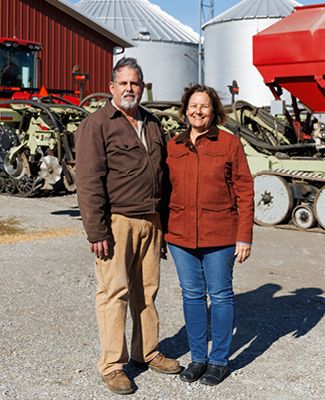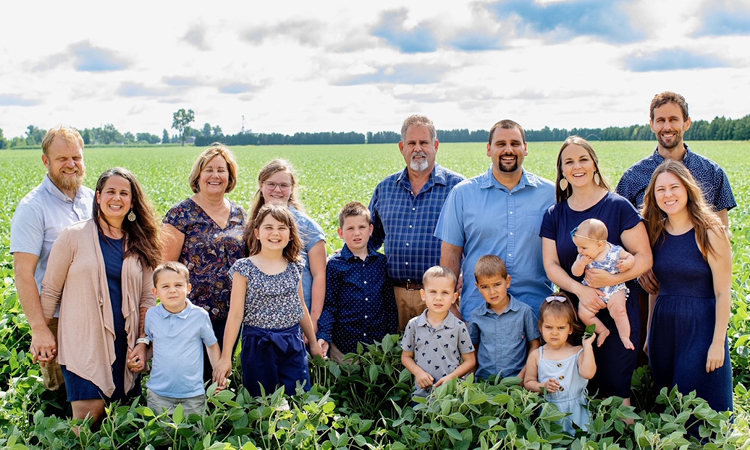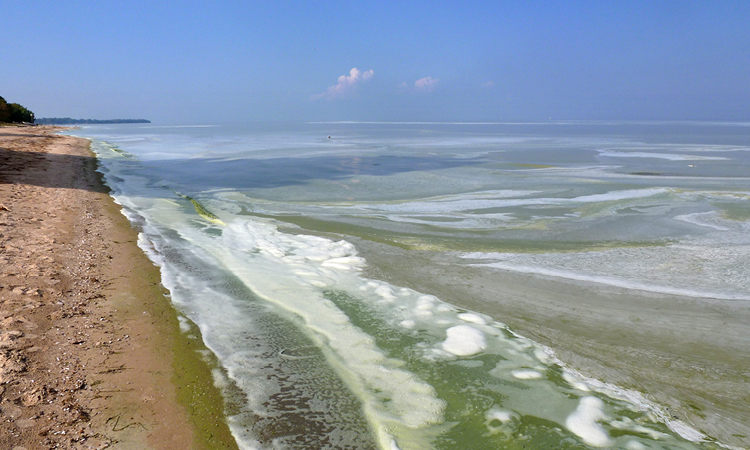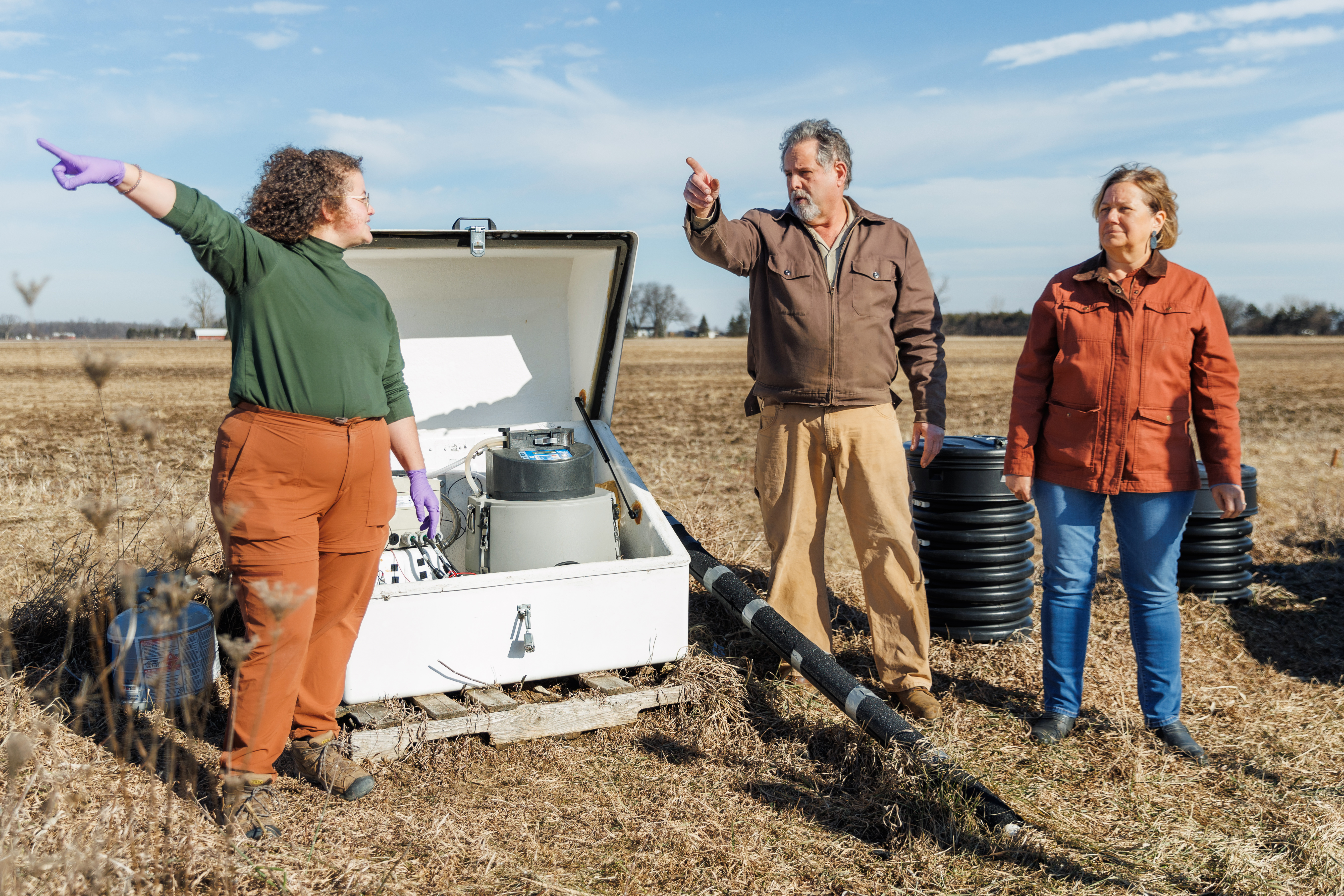Farming for the Future

Farming for the Future
May 21, 2024For nearly 160 years, six generations of Isley family farmers have cultivated and preserved farmland in Michigan’s Lenawee County.
Sunrise Farms, now a 1,100-acre corn and soybean farm, is operated by Jim and Laurie Isley and their youngest son, Jake. Jim and Jake make up the fifth and sixth generations of Isley farmers on the land in the River Raisin Watershed, located about 25 miles from the shores of western Lake Erie.
Jim and Laurie Isley met at MSU, where Laurie earned a degree in agricultural education and Jim majore

d in animal science. Laurie also grew up on a farm, raising pigs and crops, and after they were married in 1979, they established their own farm near Jim’s parents.
The family takes pride in its stewardship of the land, implementing sustainable practices like no-till and strip-till systems, cover crops, buffers, filter strips and water retention structures to keep nutrients on the farm. They also keep their eyes on the future to help ensure another 150 years of environmentally safe and productive farmland. Their efforts led to recognition by the American Soybean Association as the 2021 Northeast Regional winner of the Conservation Legacy Award.
This Spartan farming family made natural partners for MSU Researcher Ehsan Ghane, associate professor and MSU Extension specialist in the Department of Biosystems and Agricultural Engineering.
“We met at MSU. Our son, Jake, went to MSU. We have a longstanding and close relationship with the university and that made us excited and comfortable participating in this partnership with Dr. Ghane,” Jim said.
ANOTHER TOOL IN OUR CONSERVATION TOOLBOX
Ghane’s research examines the effectiveness of two types of water management systems: controlled drainage and saturated buffers. His work explores implementation methods for these systems and measures their effectiveness at keeping nutrients in fields—and out of surrounding waterways.

Supported by partnerships with the Michigan Department of Agriculture and Rural Development (MDARD), Conservation Districts, the Michigan Soybean Committee and Michigan Department of Environment, Great Lakes, and Energy (EGLE), Ghane is developing practices he hopes will assist Michigan farmers in abiding by what he calls, “the golden rule of drainage—drain only what is necessary for crop production and not a drop more.”
Ghane’s “Edge-of-Field” research project began in 2018 on three farms in the River Raisin Watershed, investigating the effectiveness of conservation drainage practices. The Isleys are one of the farm families in the region hosting this vital research.
“We want to show how effective these practices are and show farmers how beneficial they are, so we can encourage people to implement them. We eventually want farmers to adopt these practices voluntarily to improve water quality and crop yield,” Ghane said.
Laurie said MSU’s emphasis on on-field research and allowing Michigan farmers to participate in a solutions-based approach is what drew the Isleys to the project.
“MSU has always been a leader in providing unbiased information tailored to the farm and the farmer, and adapting big-picture research into more specific issues,” Laurie said. “MSU does a great job making the science something farmers can understand and use, which is a key to the land-grant role. We know not every farmer can adopt every new technique, but every farmer can do something in the way of conservation. Research like Dr. Ghane’s provides proof that these techniques will be effective.”
It’s important to me, if my children want to farm, that I put them in the position where they are financially able to do so, but also have the land to pass along to them that is in better shape than when I started.
Jim Isley, ’79, Co-owner, Sunrise Farms
PART OF COMMUNITIES THEY CARE ABOUT
MSU collaborates with local farmers through the River Raisin Watershed Council, Michigan Farm Bureau, MSU Extension and other organizations aimed at reducing environmental impact and water quality issues in the region. Ghane and his research team recently received a $1.2 million grant extension from MDARD, enabling their work to continue.
According to Michigan Farm Bureau Conservation and Regulatory Specialist Laura Campbell, the drainage techniques Ghane and his team are implementing have already proven effective in managing nitrate losses on fields draining into the Mississippi River. Putting these techniques to work in the Western Lake Erie Basin will provide insight into whether the same will hold true for phosphorus losses into Lake Erie.

research partnership with Sunrise Farms.
Lauren Wood Photography
“Phosphorus management is a crucial step forward for the protection of the Western Lake Erie basin,” said Campbell. “Michigan farmers are invested in making sure they do the best they can to protect water quality in their own watershed.”
Campbell said research of this magnitude and scope requires stakeholder engagement, and MSU plays a key role in collaborating and communicating research processes and findings to ensure the information is available—and applicable—to farms and fields statewide.
Farming is in my blood. I grew up with it and I love it. Farming is a good teacher of patience and resilience, things I value, and it really gives perspective on the impact we have on helping a crop be successful and being good stewards of our land.
Jake Isley, ’12, Farmer, Sunrise Farms
FARMING IS A GOOD TEACHER
Jake Isley knew from an early age he wanted to work on the farm with his parents. He and his wife LeeAnn represent the future of the family operation, and participating in Ghane’s research provides foundational data to keep Sunrise Farms moving forward.
Jake sees agriculture as a complex puzzle that his family spends every day trying to solve—not only for his own farm, but also working with his peers.
“There is no ‘one-size-fits-all’ approach to agriculture and conservation practices,” Jake Isley said. “We want to continue to make progress and improvements in our system to be the best stewards of our land, lakes and water quality, but also find ways to support other farms developing systems tailored to their needs. Agriculture plays an important part in protecting the Great Lakes in Michigan, and Michigan farmers want to do what’s best for the soil and water.”
Contributing Writer(s): Justin Whitmore




